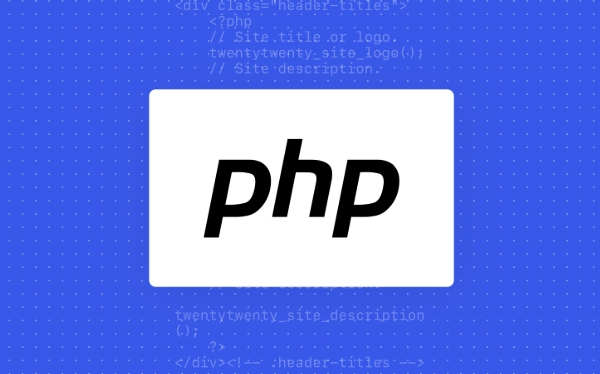 Backend Development
Backend Development
 PHP Tutorial
PHP Tutorial
 The Serverless Revolution: Deploying Scalable PHP Applications with Bref
The Serverless Revolution: Deploying Scalable PHP Applications with Bref
The Serverless Revolution: Deploying Scalable PHP Applications with Bref
Jul 28, 2025 am 04:39 AMBref enables PHP developers to build scalable, cost-effective applications without managing servers. 1. Bref brings PHP to AWS Lambda by providing an optimized PHP runtime layer, supports PHP 8.3 and other versions, and seamlessly integrates with frameworks such as Laravel and Symfony; 2. The deployment steps include: installing Bref using Composer, configuring serverless.yml to define functions and events, such as HTTP endpoints and Artisan commands; 3. Execute serverless deploy commands to complete the deployment, automatically configure API Gateway and generate access URLs; 4. For Lambda restrictions, Bref provides solutions: use S3 or EFS to deal with temporary file system restrictions, reduce cold startup delays through Provisioned Concurrency, implement timing tasks using EventBridge, and handle asynchronous queues in combination with SQS; 5. Bref is suitable for high-traffic APIs, event-driven architectures, microservices, and cost-sensitive projects, and is not suitable for long-running tasks or relying on persistent memory caches. Therefore, Bref provides PHP developers with a low threshold path to enter the serverless field, realizing a modern application architecture with free operation and maintenance, automatic expansion and on-demand billing.

Serverless isn't just for Node.js or Python anymore — PHP developers can now build scalable, cost-efficient applications without managing servers, thanks to Bref . If you've been hesitant to adopt serverless because of PHP's traditional reliance on long-running processes or shared hosting, it's time to reconsider. Bref makes it not only possible but practical to run PHP on AWS Lambda.

Here's how Bref is changing the game and how you can deploy scalable PHP apps with it.
What Is Bref and Why It Matters for PHP
Bref is an open-source project that brings PHP to AWS Lambda by providing optimized runtime layers. AWS Lambda natively supports languages like JavaScript and Python, but not PHP. Bref fills that gap by packaging PHP runtimes (like PHP 8.3) as AWS Lambda layers, allowing you to run PHP code in a serverless environment.

Why this matters:
- No server management : You write code, deploy it, and AWS handles scaling, patching, and availability.
- Cost efficiency : You pay only when your functions run — ideal for apps with variable traffic.
- Built for scalability : Lambda automatically scales from zero to thousands of concurrent executions.
- Seamless integration with AWS : Use API Gateway, S3, DynamoDB, SQS, and more with minimal configuration.
Bref doesn't just let you run PHP on Lambda — it integrates smoothly with the Laravel, Symfony, and other frameworks, making migration easier.

How to Deploy a PHP App with Bref
Deploying a PHP application with Bref typically involves three steps: setting up your project, defining serverless configuration, and deploying via the Serverless Framework.
1. Install Bref and Configure serverless.yml
First, install Bref via Composer:
composer requires bref/bref
Then, set up your serverless.yml to define functions and events:
service: my-php-app
Provider:
name: aws
runtime: php-83
plugins:
- ./vendor/bref/bref
functions:
website:
handler: public/index.php
timeout: 28 # Keep under 30 seconds for web requests
Events:
- httpApi: '*'
# Optional: Console handler for Artisan commands
artisan:
handler: artisan
timeout: 120
layers:
- ${bref:layer.php-83-console}This config sets up:
- An HTTP endpoint powered by API Gateway (via
httpApi) - A Lambda function that runs your
public/index.php(great for Laravel or Symfony front controllers) - A separate function for running Artisan commands (eg, migrations)
2. Write Framework-Agnostic or Framework-Specific Code
Bref works great with Laravel. For example, in a Laravel app, your public/index.php stays untouched. Bref routes all HTTP requests through it, just like Apache or Nginx would.
For console commands (like php artisan migrate ), Bref provides a special console layer . You can trigger it via the AWS CLI or CI/CD pipeline:
serverless invoke -f artisan --data "migrate --force"
3. Deploy
Run the deploy command:
serverless deploy
That's it. Bref packages your code, uploads it to Lambda, configures API Gateway, and give you a URL to access your app.
Handling Limitations of Serverless PHP
While powerful, Lambda has constraints. Bref helps you work around them:
- Execution timeout (15 minutes max) : Great for web requests and short-lived tasks. For longer jobs, use Step Functions or offload work to Fargate.
- Ephemeral filesystem : You can't write to
/tmppermanently. Use S3 or EFS for persistent storage. - Cold starts : Can add latency. Bref minimizes this with optimized layers, and you can use Provisioned Concurrency for critical endpoints.
- No traditional cron : Use EventBridge (CloudWatch Events) to trigger Lambda functions on a schedule.
For background jobs, Bref supports SQS-triggered functions:
functions:
process-orders:
handler: functions/process-orders.php
Events:
- sqs: ${ssm:/my-app/sqs-queue-arn}This lets you process queues without running a worker server 24/7.
When Should You Use Bref?
Bref shines in:
- High-traffic Laravel APIs that need auto-scaling
- Event-driven applications (eg, processing uploads, sending emails)
- Microservices where you want to isolate functionality
- Cost-sensitive projects where you want to pay only for usage
It's less ideal for:
- Long-running batch jobs (consider AWS Batch or Fargate)
- Apps requiring persistent in-memory caching (though Redis helps)
- Legacy apps that depend heavily on
.htaccessor mod_php features
Basically, Bref removes the infrastructure barrier for PHP developers entering the serverless world. With minimum configuration and strong framework support, you can deploy scalable, secure, and efficient PHP apps — without ever touching a server.
The above is the detailed content of The Serverless Revolution: Deploying Scalable PHP Applications with Bref. For more information, please follow other related articles on the PHP Chinese website!

Hot AI Tools

Undress AI Tool
Undress images for free

Undresser.AI Undress
AI-powered app for creating realistic nude photos

AI Clothes Remover
Online AI tool for removing clothes from photos.

Clothoff.io
AI clothes remover

Video Face Swap
Swap faces in any video effortlessly with our completely free AI face swap tool!

Hot Article

Hot Tools

Notepad++7.3.1
Easy-to-use and free code editor

SublimeText3 Chinese version
Chinese version, very easy to use

Zend Studio 13.0.1
Powerful PHP integrated development environment

Dreamweaver CS6
Visual web development tools

SublimeText3 Mac version
God-level code editing software (SublimeText3)

Hot Topics
 How to use PHP to build social sharing functions PHP sharing interface integration practice
Jul 25, 2025 pm 08:51 PM
How to use PHP to build social sharing functions PHP sharing interface integration practice
Jul 25, 2025 pm 08:51 PM
The core method of building social sharing functions in PHP is to dynamically generate sharing links that meet the requirements of each platform. 1. First get the current page or specified URL and article information; 2. Use urlencode to encode the parameters; 3. Splice and generate sharing links according to the protocols of each platform; 4. Display links on the front end for users to click and share; 5. Dynamically generate OG tags on the page to optimize sharing content display; 6. Be sure to escape user input to prevent XSS attacks. This method does not require complex authentication, has low maintenance costs, and is suitable for most content sharing needs.
 How to use PHP combined with AI to achieve text error correction PHP syntax detection and optimization
Jul 25, 2025 pm 08:57 PM
How to use PHP combined with AI to achieve text error correction PHP syntax detection and optimization
Jul 25, 2025 pm 08:57 PM
To realize text error correction and syntax optimization with AI, you need to follow the following steps: 1. Select a suitable AI model or API, such as Baidu, Tencent API or open source NLP library; 2. Call the API through PHP's curl or Guzzle and process the return results; 3. Display error correction information in the application and allow users to choose whether to adopt it; 4. Use php-l and PHP_CodeSniffer for syntax detection and code optimization; 5. Continuously collect feedback and update the model or rules to improve the effect. When choosing AIAPI, focus on evaluating accuracy, response speed, price and support for PHP. Code optimization should follow PSR specifications, use cache reasonably, avoid circular queries, review code regularly, and use X
 PHP creates a blog comment system to monetize PHP comment review and anti-brush strategy
Jul 25, 2025 pm 08:27 PM
PHP creates a blog comment system to monetize PHP comment review and anti-brush strategy
Jul 25, 2025 pm 08:27 PM
1. Maximizing the commercial value of the comment system requires combining native advertising precise delivery, user paid value-added services (such as uploading pictures, top-up comments), influence incentive mechanism based on comment quality, and compliance anonymous data insight monetization; 2. The audit strategy should adopt a combination of pre-audit dynamic keyword filtering and user reporting mechanisms, supplemented by comment quality rating to achieve content hierarchical exposure; 3. Anti-brushing requires the construction of multi-layer defense: reCAPTCHAv3 sensorless verification, Honeypot honeypot field recognition robot, IP and timestamp frequency limit prevents watering, and content pattern recognition marks suspicious comments, and continuously iterate to deal with attacks.
 PHP calls AI intelligent voice assistant PHP voice interaction system construction
Jul 25, 2025 pm 08:45 PM
PHP calls AI intelligent voice assistant PHP voice interaction system construction
Jul 25, 2025 pm 08:45 PM
User voice input is captured and sent to the PHP backend through the MediaRecorder API of the front-end JavaScript; 2. PHP saves the audio as a temporary file and calls STTAPI (such as Google or Baidu voice recognition) to convert it into text; 3. PHP sends the text to an AI service (such as OpenAIGPT) to obtain intelligent reply; 4. PHP then calls TTSAPI (such as Baidu or Google voice synthesis) to convert the reply to a voice file; 5. PHP streams the voice file back to the front-end to play, completing interaction. The entire process is dominated by PHP to ensure seamless connection between all links.
 How to use PHP to combine AI to generate image. PHP automatically generates art works
Jul 25, 2025 pm 07:21 PM
How to use PHP to combine AI to generate image. PHP automatically generates art works
Jul 25, 2025 pm 07:21 PM
PHP does not directly perform AI image processing, but integrates through APIs, because it is good at web development rather than computing-intensive tasks. API integration can achieve professional division of labor, reduce costs, and improve efficiency; 2. Integrating key technologies include using Guzzle or cURL to send HTTP requests, JSON data encoding and decoding, API key security authentication, asynchronous queue processing time-consuming tasks, robust error handling and retry mechanism, image storage and display; 3. Common challenges include API cost out of control, uncontrollable generation results, poor user experience, security risks and difficult data management. The response strategies are setting user quotas and caches, providing propt guidance and multi-picture selection, asynchronous notifications and progress prompts, key environment variable storage and content audit, and cloud storage.
 PHP realizes commodity inventory management and monetization PHP inventory synchronization and alarm mechanism
Jul 25, 2025 pm 08:30 PM
PHP realizes commodity inventory management and monetization PHP inventory synchronization and alarm mechanism
Jul 25, 2025 pm 08:30 PM
PHP ensures inventory deduction atomicity through database transactions and FORUPDATE row locks to prevent high concurrent overselling; 2. Multi-platform inventory consistency depends on centralized management and event-driven synchronization, combining API/Webhook notifications and message queues to ensure reliable data transmission; 3. The alarm mechanism should set low inventory, zero/negative inventory, unsalable sales, replenishment cycles and abnormal fluctuations strategies in different scenarios, and select DingTalk, SMS or Email Responsible Persons according to the urgency, and the alarm information must be complete and clear to achieve business adaptation and rapid response.
 How to use PHP to develop AI-driven advertising delivery PHP advertising performance optimization solution
Jul 25, 2025 pm 06:12 PM
How to use PHP to develop AI-driven advertising delivery PHP advertising performance optimization solution
Jul 25, 2025 pm 06:12 PM
PHP provides an input basis for AI models by collecting user data (such as browsing history, geographical location) and pre-processing; 2. Use curl or gRPC to connect with AI models to obtain click-through rate and conversion rate prediction results; 3. Dynamically adjust advertising display frequency, target population and other strategies based on predictions; 4. Test different advertising variants through A/B and record data, and combine statistical analysis to optimize the effect; 5. Use PHP to monitor traffic sources and user behaviors and integrate with third-party APIs such as GoogleAds to achieve automated delivery and continuous feedback optimization, ultimately improving CTR and CVR and reducing CPC, and fully implementing the closed loop of AI-driven advertising system.
 Beyond the LAMP Stack: PHP's Role in Modern Enterprise Architecture
Jul 27, 2025 am 04:31 AM
Beyond the LAMP Stack: PHP's Role in Modern Enterprise Architecture
Jul 27, 2025 am 04:31 AM
PHPisstillrelevantinmodernenterpriseenvironments.1.ModernPHP(7.xand8.x)offersperformancegains,stricttyping,JITcompilation,andmodernsyntax,makingitsuitableforlarge-scaleapplications.2.PHPintegrateseffectivelyinhybridarchitectures,servingasanAPIgateway





